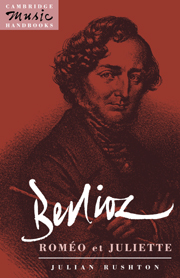Book contents
- Frontmatter
- Contents
- List of abbreviations and acknowledgements
- 1 Introduction
- 2 The genesis of Roméo et Juliette
- 3 Berlioz, Shakespeare, and Garrick
- 4 Exordium: Introduction and Prologue; Roméo seul
- 5 The heart of the matter: Scène d'amour; La reine Mab
- 6 Tragedy and reconciliation: Convoi funèbre; Roméo au tombeau; Finale
- 7 A view from 1839 by Stephen Heller
- 8 Performance and reception: 1839 and beyond
- 9 Afterword: Roméo et Juliette as covert opera
- Appendix 1
- Appendix 2
- Notes
- Select bibliography
- Index
2 - The genesis of Roméo et Juliette
Published online by Cambridge University Press: 18 November 2009
- Frontmatter
- Contents
- List of abbreviations and acknowledgements
- 1 Introduction
- 2 The genesis of Roméo et Juliette
- 3 Berlioz, Shakespeare, and Garrick
- 4 Exordium: Introduction and Prologue; Roméo seul
- 5 The heart of the matter: Scène d'amour; La reine Mab
- 6 Tragedy and reconciliation: Convoi funèbre; Roméo au tombeau; Finale
- 7 A view from 1839 by Stephen Heller
- 8 Performance and reception: 1839 and beyond
- 9 Afterword: Roméo et Juliette as covert opera
- Appendix 1
- Appendix 2
- Notes
- Select bibliography
- Index
Summary
From 1827: inspiration
The ‘supreme drama’ of his life has never been better told than by Berlioz himself. It occurred during the 1827 Shakespeare season given in Paris by a British troupe, a season which made an enduring impression on all French Romantics (see Chapter 3); but even the poets and playwrights were not more profoundly affected than the composer, who wrote: ‘I saw Harriet Smithson, whom I married five years later, playing Ophelia. The impression her outstanding talent, indeed her dramatic genius, made on my heart and mind, is only comparable to the upset which I suffered from the poet whose worthy interpreter she was. I can say no more.’ He nevertheless describes his perturbation of mind and body, then, his sense of irony reviving, continues:
When I came out after the performance of Hamlet, terrified by what I had experienced, I solemnly swore not to expose myself for a second time to the Shakespearean fire.
Next day they announced Romeo and Juliet … I had my pass to the Odéon pit; so, afraid new instructions might be given to the porter which would stop me getting in the usual way, as soon as I saw the announcement for this drama, I made doubly sure of my place by rushing to the box office to buy a stall. […].
After the melancholy, the heart-rending suffering […], after the icy winds of Denmark, to bask in the ardent sunshine and balmy Italian night, to watch the growth of this love, swift as thought, boiling like lava, imperious, irresistible, immense yet chaste and lovely as an angel's smile, smile, those furious scenes of revenge, those desperate embraces, the despairing struggles of love and death, were all too much. […]
- Type
- Chapter
- Information
- Berlioz: Roméo et Juliette , pp. 7 - 14Publisher: Cambridge University PressPrint publication year: 1994



